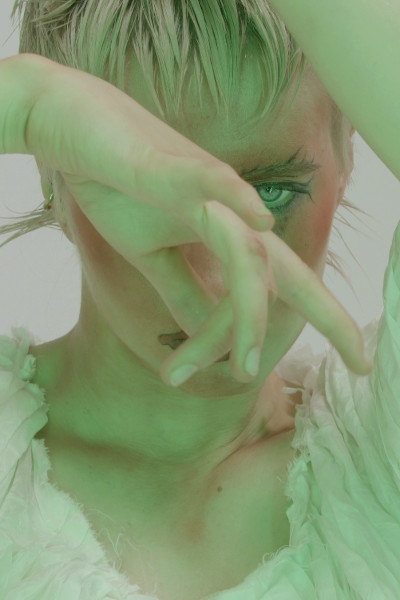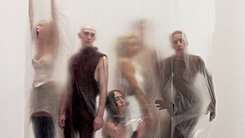Exhibition
Move 2022 Exhibition
Culture club - Corps collectifs
�6 - 23 Oct 2022
�6 - 23 Oct 2022

The event is over

Marie Tučková in collaboration with Raffia Li, Iga Świeściak and Dorota Tučková. « The Polyphonic » Womb, 2021. Videostill. Courtesy of the artist.
On the occasion of the French then Czech Presidency of the Council of the European Union, the Centre Pompidou and the National Gallery of Prague are collaborating to propose a special edition of Move festival. In October, the 6th edition of the festival is honoring the Czech scene while the large gallery of the Fair Trade Palace in Prague is welcoming the festival with the theme “Intimacy as resistance”. For this edition in Paris, Move festival examines the question of collective bodies, with the artworks of Lukáš Hofmann, Daniela and Linda Dostálková, Julia Gryboś and Barbora Zentková, Marie Tučková presented for the exhibition.

Marie Tučková in collaboration with Raffia Li, Iga Świeściak and Dorota Tučková. « The Polyphonic » Womb, 2021. Videostill. Courtesy of the artist.
Daniela & Linda Dostálková
Daniela & Linda Dostálková (1979 and 1977) work as a duo, live in Prague. The work of Daniela & Linda Dostálková deals with a concept of the autonomous hybrid social “art practice”—blurring the lines between disciplines, it challenges accepted distinctions in the questioning of identity. They examine the complex problems presently faced by animal welfare activists, the persuasive strategies of their campaigns and the visual language they draw on. They investigate the role that is played by charismatic and non-charismatic species and the desirable or undesirable “wildness of nature” in these campaigns. Their work has been exhibited at PLATO, Ostrava (Czech Republic), Piktogram Gallery, Warsaw (Poland) or the New Synagogue in Zilina (Slovakia).
The installation Half-trained Arguments by Daniela & Linda Dostálková brings together extensive video-series and pet beds with the intercrossing topics of social and species inequality, manipulation in human language and animal training, hypocrisy of mindful fashion, food, lifestyle, welfare correctness and others. The artists address the specificity of human behaviour and human community via juxtaposing a super-flexible human body working as a sort of avatar, with the incongruity of a frozen turkey. The hand-sewn pet beds are covered with silkscreened statements originated in various sources, linked to animal activist rights and ironically refer to the hierarchy between man and animal. These beds invite the audience to watch the films by seating on the dog beds, in the position of the animal.
Julia Gryboś and Barbora Zentková
On the occasion of Move festival, the artists produced a new installation that can be perceived as a gradual development following a number of previous projects thematizing labor conditions, framed with an efficiency pressure and chronic exhaustion. So far, the dominant motif of tension leading up to a potential collapse, is replaced by release here. The necessity to slow down, to seek for care and healing has become an obvious answer to the ubiquitous feeling of crisis. The ritual of relaxation is encoded, or rather embodied within the installation on many levels, the most apparent being in the way in which the thin cotton ropes are woven into the metal constructions. A slow gradient of pastel colors is formed as a result of an infusion of tea leaves, used here in a reference to tea’s soothing properties.
Marie Tučková
Marie Tučková a.k.a Ursula Uwe (1994) works in media of text, video, drawing, songwriting, live performing and installation. Tučková’s work investigates the politics of listening, hierarchy of voices, polyphony, various forms of collaboration and the overlapping of the political and poetic language. In her work, she draws attention to the connection between the exploitation of nature and female and queer bodies. Her work is based on long term research, collaboration, on improvisation as an endless rehearsal. Her work has been shown at the Academia Biennial of young art, Bolzano (Italy), Futura, Prague (Czech Republic), wellwellwell, Vienna (Austria) and the Jindřich Chalupecký prize exhibition at PLATO, Ostrava (Czech Republic).
The installation explores the politics of listening, the hierarchy of voices, various forms of collaboration and the interweaving of political and poetic language. It presents the womb as a place of polyphony and constant sonic resonance, interweaving the stories of fluid bodies like a dead river, symbolising dying ecosystems. Large hanging tapestries of vaginal trees provide a more intimate reception space to view the film examining the polyphonic womb as an instance of collective survival.
Lukáš Hofmann
Lukáš Hofmann is an artist and curator. Fascinated by the skin as a protective and vulnerable membrane or bodily fluids and exchanges, his artistic strategies revolve around notions such as transparency, fluidity, arrangement and textures. Contingency, instability or formlessness are constitutive elements of his work. The film Sospiri uses images recorded during a performance in
2018 at the National Gallery in Prague. Inspired by the division into chapters of an opera, it deploys bodies that are both resolutely contemporary and wearing medieval-inspired clothing, covered with Vaseline that embrace each other while exchanging breath, or wearing strange accessories that allow the pouring of a liquid that seems precious into the participants’ mouths. This crepuscular film offers a plunge into a fantastic universe that is at once troubled, fascinating and unsettling.
With Adrian Altman, Jan Brazina, Mwoyo Dziruni, Dourane Fall, Lukáš Hofmann, Scott Hopper, Zuzana Jirova, Frantisek Mucha, Alexander Ostojski, Daena Phan, Elena Veleckaite, Nicole Walker et Marat Zakirov
Where
Level –1
When
06 Oct 2022
From 6pm�7 - 23 Oct 2022
11am - 9pm, every days except tuesdays